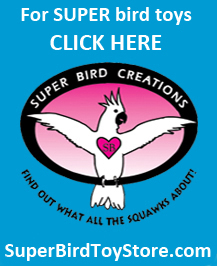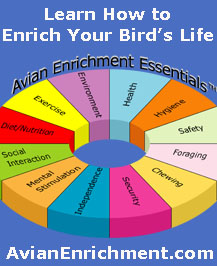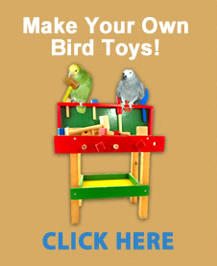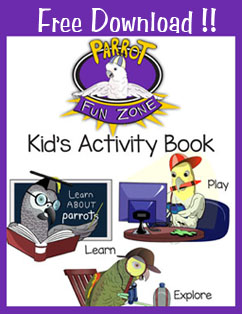|
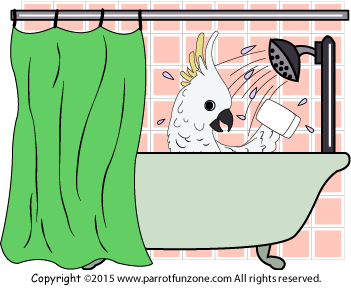 Hygiene, by definition, is the practice of cleanliness that prevents the spread of disease and ensures the preservation of health. In captivity, our birds depend on us to ensure their needs are met when it comes to good hygiene. Hygiene, by definition, is the practice of cleanliness that prevents the spread of disease and ensures the preservation of health. In captivity, our birds depend on us to ensure their needs are met when it comes to good hygiene.
Good hygiene, as it relates to our birds, encompasses two primary areas:
- Environmental cleanliness
- Keeping your bird's cage, dishes, perches and toys clean.
- Using safe methods to control pests.
- "Personal" bird hygiene (grooming)
- Providing daily opportunities for bathing.
- Maintaining trimmed nails and beaks.
Cleaning
In the wild, birds are not "required" to live in close proximity to their droppings. They have a continual supply of fresh unspoiled food to choose from as well as access to fresh water when they need it. In our homes, our birds depend on us to make sure these needs are met. Maintaining a clean environment helps to prevent the spread of disease which can spread very easily via contaminated drinking water, droppings and feather dust.
Probably most of us wish we could just tell our birds to "CLEAN YOUR ROOM!" Unfortunately, it is up to us to not only clean their "personal space" but, also to scrub the food stuck on the walls, the poop off of the floor, the seed hulls stuck in the floor boards, the feathers in the heating vents....you get the picture. Keeping up with the mess is a seemingly never ending chore.
Fortunately, there are many bird-safe or natural alternative cleaning products available that, when combined with a routine cleaning schedule, will make this thankless job much more manageable.
For helpful tips on cleaning, check out our related article,Cleaning Tips
Pest Control
Insects and other pests can spread disease to humans and animals through their droppings and saliva. Ants, fruit flies, fleas, mosquitos, moths, flies and other creepy crawlers are also a major nuisance. Employing bird-safe pest control measures helps to prevent the spread of disease. Because most commercial pest control products also present hazards to our bird's health it is important to research natural, bird-safe remedies to deal with any pests that may be present in your home.
Bathing
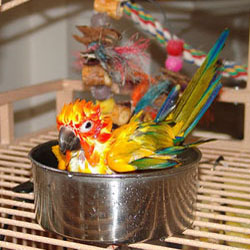 Parrots spend several hours a day preening and grooming their feathers. Systematically their beaks travel from feather to feather removing dirt and putting everything back in place. During this process they often fluff and shake to get rid of dust, dirt and loose feathers. Parrots spend several hours a day preening and grooming their feathers. Systematically their beaks travel from feather to feather removing dirt and putting everything back in place. During this process they often fluff and shake to get rid of dust, dirt and loose feathers.
In the wild, parrots have many opportunities to bathe in the tropical rains or various bodies of water. In our homes, we need to provide ample opportunities for our birds to bathe. This will not only help keep them clean but it will also promote good health and keep them in beautiful feather.
Birds often have preferences on how they like to bathe. Here are some ways that your bird might like to bathe at home:
- Wading: Many birds are pool bathers and love to splash around in shallow water. Try a birdbath, bowl or pan of water no higher than your bird’s legs, placed at the bottom of its cage. Some bird's even love to bathe in a sink with the water running gently.
- Misting: Most birds prefer a gentle falling mist like spray. Point the mister in a fashion that allows the water to fall down gently like rain. Be careful not to spray directly into the face as this is uncomfortable and may frighten your bird.
- Showering: Many birds like the sound of running water and the larger drops of a shower. Shower perches are available that provide non-slip surfaces for your bird to grip. A few hints about showering:
- Try showering with your bird and have a fun time together "singing in the rain."
- Place the perch off to the side not directly under the spray.
- Allow your parrot time to adapt to the shower on its perch while it observes you shower.
- Gradually introduce your parrot companion to the water.
- Rolling in Leaves: For small birds, try placing wet lettuce leaves or large leafy green vegetables at the bottom of their cage. Many small birds love to roll in the leaves and get some good nutrition at the same time.
If your bird appears reluctant to bathe using one method then don't give up, just offer up a different bathing option.
For more tips on bathing, check out our related article, Bathing Tips.
Check out these videos of birds using different methods of bathing:
Beaks and Nails
In the wild, a parrot's beak and nails are maintained naturally in the course of chewing, nut cracking, nest building, climbing, tearing apart fruits and vegetables, landing and walking on rough branches, and swiping beaks frequently on hard, rough surfaces. All this “parrot work” assists in manicuring their beaks and nails.
Domestic parrots don't have as varied an environment or activity level. Therefore, some level of human intervention is required to achieve what is accomplished naturally by their wild counterparts. You can help your bird keep their beak and nails trim by:
- providing your bird with a variety of perches (natural branches and a grooming perch)
- giving your bird plenty of destructible toys and shelled nuts to promote chewing
- taking your bird to the vet or a bird professional for nail and beak trims
|







































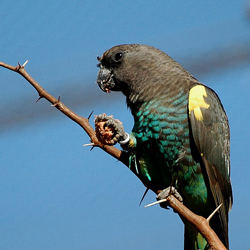


































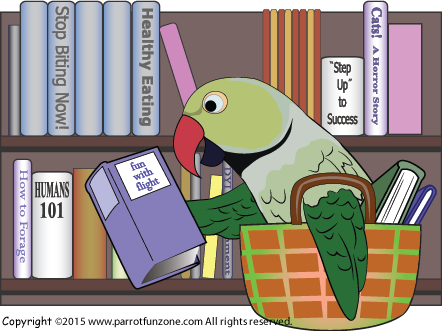
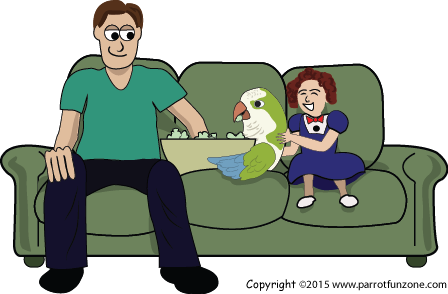
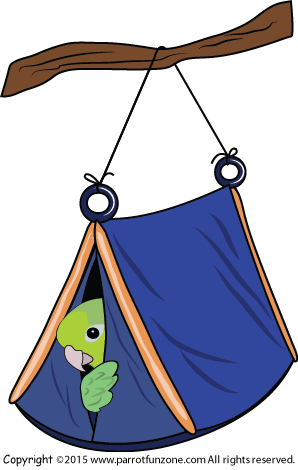 What is Security?
What is Security?
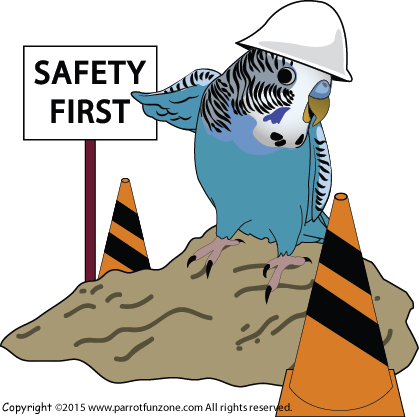 Our pet birds are dependent on us to ensure they are kept safe from harm in our homes. Just like little children, our bird's curiosity can help them find very creative ways to find trouble if they are left unsupervised. Most household related deaths are the result of either exposure to a toxic substance or due to a physical trauma.
Our pet birds are dependent on us to ensure they are kept safe from harm in our homes. Just like little children, our bird's curiosity can help them find very creative ways to find trouble if they are left unsupervised. Most household related deaths are the result of either exposure to a toxic substance or due to a physical trauma. Hygiene, by definition, is the practice of cleanliness that prevents the spread of disease and ensures the preservation of health. In captivity, our birds depend on us to ensure their needs are met when it comes to good hygiene.
Hygiene, by definition, is the practice of cleanliness that prevents the spread of disease and ensures the preservation of health. In captivity, our birds depend on us to ensure their needs are met when it comes to good hygiene.  Parrots spend several hours a day preening and grooming their feathers. Systematically their beaks travel from feather to feather removing dirt and putting everything back in place. During this process they often fluff and shake to get rid of dust, dirt and loose feathers.
Parrots spend several hours a day preening and grooming their feathers. Systematically their beaks travel from feather to feather removing dirt and putting everything back in place. During this process they often fluff and shake to get rid of dust, dirt and loose feathers.